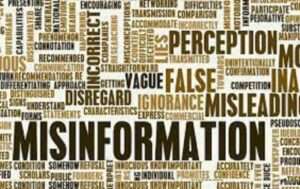The Volokh Conspiracy
Mostly law professors | Sometimes contrarian | Often libertarian | Always independent
The Demand for Political Misinformation is a Bigger Problem than the Supply - Even in the Age of AI
Economist Tyler Cowen elaborates on some of the reasons why. The root of the problem is that voters have poor incentives to become well-informed and evaluate information objectively.

Over the last few years, political commentators have become more and more concerned about voter susceptibility to lies and misinformation. You might even say the subject has been made great again! Though some of us have been warning about these dangers since long before the rise of Trump. The latest focus of concern is misinformation generated by AI. This innovation could potentially make misinformation seem even more credible than previous technologies did!
In an insightful recent Bloomberg column (unfortunately paywalled), economist Tyler Cowen, my George Mason University colleague, suggests that concerns about AI misinformation may be overblown - not because voters can easily see through it, but because misinformation doesn't have to be very sophisticated to deceive those predisposed to believe it:
I have a prediction: AI-generated misinformation will not be a major problem in the 2024 campaign. But that's only because so many other forms of misinformation are already so rife.
Speaking in economic terms, the problem with misinformation is demand, not supply. Consider, for example, the view that the 2020 election was stolen from former President Donald Trump. To explain what happened in simple terms, there was a demand for this misinformation, namely from some aggrieved Trump supporters, and there was also a supply, most prominently from Trump himself. Supply met demand, the issue was focal and visceral, and the misinformation has continued to this day.
No one needed an AI-generated fake video of state officials fabricating ballots…. Even simpler technologies, such as photo manipulation, were not driving the fake news. Rather, the critical element was that many Trump supporters wanted to believe that their candidate had been wronged, and so Trump provided a narrative of victimization. Unfortunately, no proof or even pseudo-proof was required — and objective evidence against Trump has not broken his support….
Misinformation is, in many cases, a fundamentally low-tech product.
I have been making similar points for years (e.g. here, here, and here). The root of the problem of political misinformation is not that the deceptions are highly sophisticated or that a particular new technology (e.g. - social media) makes it easy to produce and spread it, but that voters have little incentive to seek out the truth and evaluate information objectively. Many instead act as biased "political fans," lapping up whatever ideas - including ridiculous conspiracy theories - support their preexisting views and prejudices.
Donald Trump's "Big Lie" about the 2020 election is a particularly egregious example of this phenomenon. But there are many other cases, including some that disproportionately appeal to left-wing voters, as opposed to right-wing ones. It would be a mistake to assume the phenomenon is confined to any one side of the political spectrum, even if the political right - at this moment in history - may have it worse.
The problem is further exacerbated by the enormous size, scope, and complexity of modern government, which makes it difficult for even relatively knowledgeable and conscientious voters to have more than a very superficial understanding of most policy issues. Voters ignorant about the basic structure of government and about how most specific policies work are more susceptible to various types of deception and misinformation.
In a recent article, I go over various strategies for alleviating political ignorance and bias, and argue that the best approach to addressing widespread voter ignorance and bias is to empower people to make more decisions by "voting with their feet" and fewer at the ballot box. Foot voters have much better incentives to seek out accurate information and evaluate it objectively than ballot box voters too. But I recognize that there are other potential strategies, as well, and suggest some of them are also worth pursuing.
Whatever we think of potential solutions, the beginning of wisdom is to recognize that the problem is rooted in demand, far more than supply. It long predates AI and other modern technologies, and it is not even clear that the latter have made it significantly worse than before.


Show Comments (48)